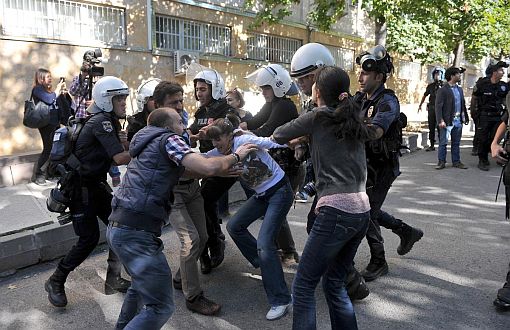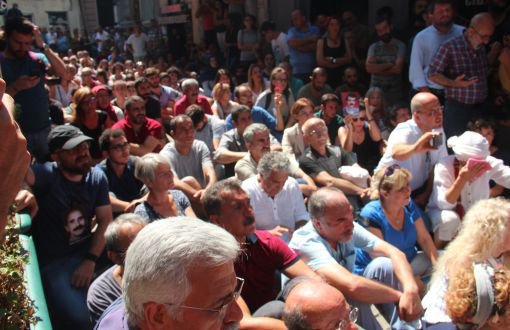lick to read the article in Turkish
Our activities here are mostly formed according to the needs of the on-going struggle in Turkey.
We are trying to provide international support for our friends during the trials of academics that started on December 5, 2017.
We have talked to Muzaffer Kaya about the struggle of the academics in Berlin, Germany.
Asst. Prof. Dr Muzaffer Kaya was discharged from his position at Nişantaşı University Faculty of Social Work and had spent 40 days behind bars over signing the declaration "We will not be a party to this crime" that was shared with the public by the Academics for Peace (BAK).
Now he has been in Berlin for one year and does research on "the political polarization of migrants from Turkey" at the Technical University of Berlin.
Kaya told us about the communities he met when he first came to Berlin and about the BAK - Germany that has newly founded an association there.
"Over a hundred of academics are in Germany"
Germany has become one of the first stops for many academics for Turkey who have left the country. On the other hand, it kind of serves a transition country to other European countries as well. Which factors have come into play making Germany one of the first countries on the list for academics?
A Significant number of academics who were able to leave Turkey, have come to Germany in the wake of the discharges and investigations. I do not know the exact number but I could say that it is over a hundred.
The solidarity among the academics from Turkey in Germany and special courses that were opened for academics under risk, have played an important role in this. When a similar program was launched in France as well, many of our colleagues went to France too. Besiders Germany, there is now a network of BAK in France and England as well.
"We found an already established network when we first came here"
When you first came to Germany, what kind of an environment did you encounter in terms of organizations and associations?
When we first came here, we discovered an already established network called the BAK-Germany. The signees from Turkey and Germany had established the BAK-Germany network to provide a more efficient organization of solidarity here.
Almost all of the signees who arrived here, asl well as many other academics who were not signees of the declaration but wanted to contribute to the works here, participated in this network. I am one of those, who, for one year, has been trying to do some work within this network.
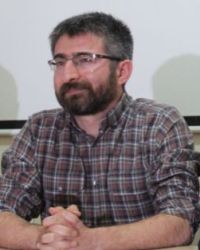
"Our priority is solidarity with our friends in Turkey".
What kind of works do you carry out here?
During this process, our prior goal was to organize an effective act of solidarity with our friends in Turkey. We have taken two important steps in this respect. First, we founded an online education portal, called the Off-University. It is still in the start-up phase but if we manage to improve it as we imagine, it could turn into an institution where our colleagues who were discharged in Turkey, could lecture, and that provides a contribution to producing critical knowledge.
Secondly, we completed the foundation process of BAK-Germany association. It was a tough decision for a heterogene group like us, to unite under the umbrella of an association, but we needed to do this in order to be able to work more efficiently in Germany. Besides playing an important role in organizing the first-hand financial solidarity, the association could as well shoulder other academic or political responsibilities in the future.
In addition, we are trying to organize a similar institution to the Solidarity Academies that were opened in Turkey, also in Berlin. The first seminars will begin on January, 2018.
"BAK - Germany"
The first general meeting of BAK-Germany was held on November 25. How did things go on that day? How was the reactions? Have your initial works taken a shape?
The meeting lasted two days and approximately 40 academics attended the meeting. During these two days, we discussed on possible problems that could arise from switching from a rather flexible network to working as an association.
We mainly discussed about our internal organization and mission, and determined our general principles.
We could some up our mission under three topics: Organizing the internal solidarity among the academics in Germany, acting in solidarity with our friends in Turkey and continue to contribute to our fight for peace and democracy like stated in our peace declaration.
On the second day of the meeting, we rather discussed on practical issues and how we could be involved in the process of on-going trials.
The most positive thing about the general meeting that it made an overall gathering possible and that young academics who newly joined the BAK-Germany network, took initiative.
"Trying to provide international support to the trials"

What is on your agenda in Germany? Can the collective action with the academics in Turkey continue?
During this whole process, we tried to connect with democrat circles from Turkey in Germany as well as with both democrat and leftist academics and institutions from Germany. These bonds grow stronger with each passing day.
We are trying to draw Europe's attention to the human rights violations in Turkey. During this process, we continuously remain in contact with our academic friends in Turkey who signed the declaration.
Our activities here are mostly formed according to the needs of the on-going struggle in Turkey.
We are trying to provide international support for our friends in the trials of the academic that started on December 5, 2017.
First of all, we arranged it so that a delegation from Germany went to Turkey to observe the trials. We tried to raise awareness among the democratic public in Germany through interviews we gave to the German media. We believe that the German website of our association that we plan to open soon, will play an effective role in transferring accurate information and organizing solidarity.
Another aspect of our activities here, is to provide scholarship opportunities in Germany for discharged academics. We are negotiating with various foundations and public institutions in this respect.
"We are not the ones who deserve the accusations"
"What is your message to your colleagues in Turkey?
In the two years that have passed since the peace declaration was published, the attacks of the Government did not come to an end. Yet we we able to create a collective solidarity network during this whole process and we maintained our internal solidarity.
Now the state is after breaking our collective stand by bringing separate criminal cases against each signee. With this divisive act, they will try to obtain a statement of repentance, at least from some of the signees.
During these lawsuits, that are brought separately against each academic under a single indictment, it is crucial, that all our friend stay in touch with the "trial coordination" that was formed under the BAK.
We are not the ones who deserve to be accused nor be tried, they are. We are faced with a justice system controlled by the government that has commited war crimes and go involved into corruption be up to its eyes. We were above board, we have a firm stand, we demanded peace and we stick to our demand. (BK/DG)
BERLIN, HOW FOUR ACADEMICS SEE IT
Academic Kıvılcım: In Both Countries, Universities Under Pressure of the Same System
Academic Kaya: Struggle in Berlin Forms According to Needs of the On-going Struggle in Turkey







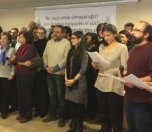
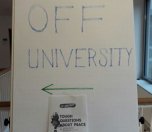
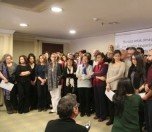
.jpg)
.jpg)
